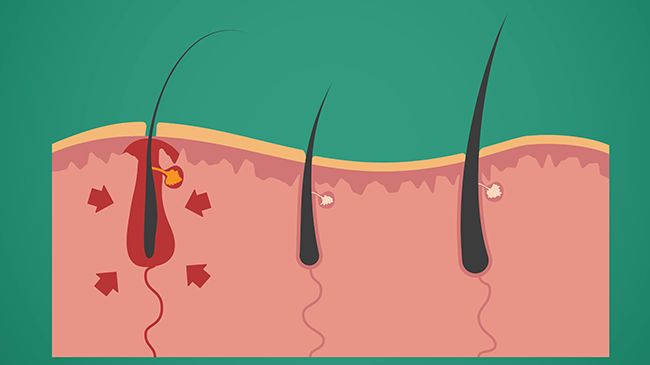Trichology is the scientific study of disorders of the hair and scalp, including anatomy, physiology, nutrition, and the chemical and physical makeup of the hair and skin. The hair and scalp can be affected by imbalances inside the body and trichologists look at the hair, scalp, and systems of the body as one. According to trichologist Yvonne Solomon of YS Hair Solutions, “A trichologist can help get to the underlying cause of your problem. Trichologists address the issue as a whole and examine a person’s diet, lifestyle, personal hygiene, hair care practices, nutrition, medical history, and genetics to see what contributes to the hair or scalp disorder.” Some of the problems a trichologist can help with include chronic itching or scaling of the scalp, a sudden bald patch that has appeared on the scalp, excessive hair loss all over the scalp, or hair breakage from chemicals.
Sometimes your hair and scalp concerns are symptoms of a something related to your health, so tea rinses and oil massages are not always the best treatments. Dermatology, trichology, and cosmetology all have limitations, and if you are unsure of how to address your hair care and scalp issues, learn more about the different fields to book your appointment with the right professional.
Dermatologist
Solomon says, “A dermatologist is a medical doctor who specializes in the skin and scalp. A dermatologist is qualified to prescribe medication and injections but a trichologist is not licensed to do so. Dermatologists help control the symptoms caused by the disorder by prescribing the appropriate topical treatment.”
Medical doctors can order blood work to investigate reasons why your disorder is happening. For example, if you are experiencing excessive hair loss all over the scalp, a doctor may want to check iron, ferritin, thyroid, sex hormones, or blood sugar levels to see if there are any imbalances that need to be addressed.
Trichologist
A trichologist stays within the scope of his or her practice and has to know when it is time to send the client to the appropriate doctor. Treatments offered by trichologists may include low level laser light therapy, ultra violet therapy, massage therapy, aromatherapy, topical treatments, and recommending nutritional supplements. They can recommend a client to get blood work from a doctor but do not draw blood or order blood work. You can bring your blood work results into a trichology clinic and a trichologist can look for clues as to what may be triggering your problem.
Solomon adds: “Many times a trichologist will refer you to a medical doctor. The doctor does not have to be a dermatologist. A trichologist may recommend you to go to an endocrinologist or a gynecologist. Some people may be recommended to a psychologist because hair loss can cause severe depression or stress.”
Licensed cosmetologist
Licensed cosmetologists are trained to do more than just enhance a person’s hair, skin, or nails. They are trained to apply chemicals or products properly, follow manufactures instructions, and take every action necessary to prevent damage to the hair, scalp, or any other body parts. A cosmetologist must know when to tell a client that a specific salon service or style is not healthy for their hair or scalp. If a cosmetologist notices hair loss on a client’s scalp or another scalp problem and is unable to help the client with that particular problem, the cosmetologist should recommend a trichologist.
It is important to understand what the cause of your problem is before you choose a treatment. If you don’t know what caused the problem, how will you know what treatment to use? Some problems of the scalp are self-correcting and no action is necessary because the issue will stop in time.

